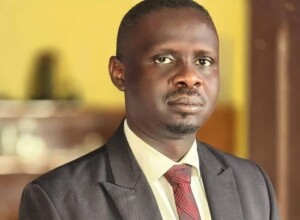Sudanese lawyers call for a civilian govt
On Thursday, hundreds of jurists demonstrated in Khartoum, demanding the military members of the Sovereignty Council to adhere to the Constitutional Document and handing over power to a civilian government.
The protestors intended to march from the office of the Empowerment* Removal Committee (ERC) to the Republican Palace, but regular forces prevented them from reaching the premises of the Sovereignty Council.
 A lawyer reads the memo to the Sovereignty Council to his protesting colleagues in downtown Khartoum, October 14 (SUNA)
A lawyer reads the memo to the Sovereignty Council to his protesting colleagues in downtown Khartoum, October 14 (SUNA)
On Thursday, hundreds of jurists demonstrated in Khartoum, demanding the military members of the Sovereignty Council to adhere to the Constitutional Document and handing over power to a civilian government.
The protestors intended to march from the office of the Empowerment* Removal Committee (ERC) to the Republican Palace, but regular forces prevented them from reaching the premises of the Sovereignty Council.
The organisers of the protest, the Jurists Group for the Protection of the Revolution and the Democratic Transition, presented their memorandum to the military component of the Sovereignty Council to the protestors.
In the memo, they demand “strict adherence to the provisions of the Constitutional Document”, that was signed in August 2019 by the then ruling military junta, headed by Lt Gen Abdelfattah El Burhan, and the leadership of the Forces for Freedom and Change coalition, and stipulates the handing over of the military chairmanship of the Sovereignty Council to a civilian member halfway the transitional period of 39 months.
“Any infringement by the Sovereignty Council on the tasks of the executive power threatens stability, brings the country back to the square of international sanctions, and destroys the efforts of the revolutionary government,” the jurists group states.
The lawyers call for the reform of the military and the judicial power structures. The “state structures, the most important of which is the formation of the Legislative Council, in addition to the restoration of the Constitutional Court, the Supreme Judicial Council, and the Higher Prosecution Council” need to be completed as soon as possible.
'Any infringement by the Sovereignty Council on the tasks of the executive power brings the country back to the square of international sanctions and destroys the efforts of the revolutionary government' – Jurists Group for the Protection of the Revolution
The memorandum further underlines the jurists’ support of the ERC, that continues its work to purge Sudan of the remnants of the ousted Omar Al Bashir regime “in accordance with the Constitutional Document”. Hindering its work “is a red line for us,” the lawyers state. “Any rejection of the decisions of the ERC constitutes a setback on the line of the revolution”.
Obstructions
The full name of the ERC is the Committee for Dismantling the June 30 1989 Regime, Removal of Empowerment and Corruption and Recovery of Public Funds. It was established by the government of Abdallah Hamdok in November 2019 with the aim to purge Sudan of the remnants of the Al Bashir regime (1989-2019).
The Committee has been working on the removal of officials affiliated with the Al Bashir regime since early 2020. For instance in February that year, it dissolved the administrative boards of the Central Bank of Sudan (CBoS) and 11 other banks. In April, 79 real estate properties that were illegally acquired by leading members of the country’s Islamic movement were confiscated, followed by the closure of several money transfer companies in the country in June.
The ERC naturally also met with resistance. On September 27, security forces charged with the protection of the office buildings of the ERC and recovered assets were instructed to abandon their posts, leaving the office and assets vulnerable. To date it is unclear who was responsible for the orders. In social media, various Sudanese accused the military establishment to be behind the move. Three days later, thousands of people took part in demonstrations in support of the ERC and called for the establishment of a civilian government.
'We shall definitely continue dismantling judicial bodies and institutions, as they obstruct justice the most' – ERC member Wajdi Saleh
The Committee decided last month to dismiss a number of judges, prosecutors, and other judicial employees in the country because of their affiliation with the regime of Al Bashir. The decision however was nullified by the High Court in Khartoum on October 5.
Despite the many challenges to its work, the Committee will proceed with “dismantling political and legal institutions that obstruct the rebuilding of the State of Law in Sudan,” ERC leading member Wajdi Saleh responded. He acknowledged that the stance of “military and civilian officials” against the dismantling of the Al Bashir networks is threatening the work of the ERC and the December Revolution. “Yet, we shall definitely continue dismantling judicial bodies and institutions, as they obstruct justice the most.”
In response to the court decision, the Jurists Group for the Protection of the Revolution and the Democratic Transition was formed on Monday, October 11. The next day, the High Court Chamber in Khartoum decided to invalidate Chapter 21 concerning senior prosecutors and return them to work, and issued a decision to return 15 judicians to service.
* Empowerment (tamkin) is the term with which the Al Bashir government supported its affiliates by granting them far-going privileges, including government functions, the setting-up of various companies, and tax exemptions.











 and then
and then